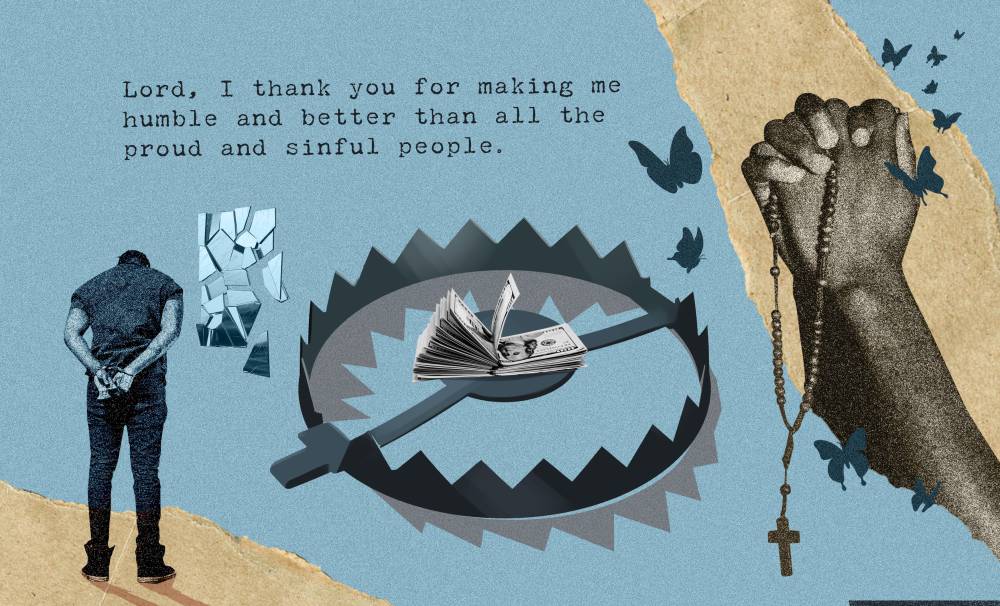From pride to humility, from corruption to conversion

October 26, 2025 – Thirtieth Sunday in Ordinary Time
Readings: Sirach 35:12-14, 16-18; Psalm 34, R. The Lord hears the cry of the poor.; 2 Timothy 4:6-8, 16-18; Gospel – Luke 18: 9-14
Today’s Gospel is about us. We are the tax collector and the Pharisee, and this gives us important lessons to learn.
First is the lesson of irony. How many of us start with good intentions, but end up like the Pharisee? Or how many of us are tax collectors who start off living life immersed in the ways of the world, only to undergo an experience of conversion?
We can choose one or the other, but at different times we were one or the other, alternating, as in going through a boom-and-bust cycle. We all struggle with this. To deny this is what could be our downfall. All of us have our positives and negatives.
When we deny the former, we can end up shortchanging not just ourselves, but others, too, with whom we could have shared our blessings or talents. This is false modesty on the one hand.
On the other hand, you have the latter, who is a person so full of himself. The joke about this Gospel parable was the prayer, “Lord, I thank you for making me humble and better than all the proud and sinful people.”
Breaking the cycle of irony
Learn from these ironies in our life that move from Pharisee to repentant tax collector, and back, from sinner to saint, and back. How do we break the cycle of irony? That’s where the second and third learnings come in.
We begin with good intentions, then we end up corrupt or somewhere on the dark side of the spectrum. What causes this? This is the second learning. To better appreciate it, let us look at the third learning also and reflect on it together.
The third learning is from the conversion of the tax collector. Basing it on Zacchaeus’ story, he might have cheated or defrauded someone, stolen, etc. He was more immersed in material things, accumulating wealth through corrupt and sinful ways. Yet, he was the one who went through conversion and prayed for God’s mercy.
We can conclude that the irony was the money acquired through corruption, not the culprit. The tax collector begged for God’s mercy to rid himself, not just of his wealth, but more importantly, because he had the desire to be embraced by God’s mercy and forgiveness.
Now we can better understand the Pharisee. For him, it was not about the money, yet he did not ask for God’s mercy. Here we see the greater evil. We see the devil incarnate in pride, the ego.
Did we not witness this in the past weeks? The flaunting of wealth—ill-gotten wealth acquired through the most despicable means—in the ridiculous number of the most expensive vehicles, the scandalously priced jewelry, dinners that put the bacchanalian feast to shame.
It was no longer the money that was the culprit here, but pride and ego. The Pharisee did not have as much money as the tax collector, but his ego was worse, more bloated. Remember how they loved places of honor, being greeted, and wearing widened phylacteries, etc. It was not about the money anymore. It was all about ego and pride.
Dung of the devil
If I may reflect, with your kind indulgence, on the corruption in our government. First, the corruption was about the money. Tons of money, literally and figuratively. Then it spiraled into flaunting a scandalous lifestyle. This was when the ego took over. It dictated greater stealing—from the tens, hundreds of millions in the Napoles days, it descended into the abyss of billions in the Pharmally et al controversy.
As Pope Francis pointed out: “And behind all this pain, death, and destruction, there is the stench of what Basil of Caesarea—one of the first theologians of the Church—called ‘the dung of the devil.’”
An unfettered pursuit of money rules. This is the ‘dung of the devil’. The service of the common good is left behind. (Pope Francis, address at the Second World Meeting of Popular Movements, 9 July 2015)
With this “dung of the devil,” the corruption spiraled into trillions, and pride ruled, no longer just money. Pride is the filthiest dung of the devil.
“‘O God, be merciful to me a sinner.’ I tell you, the latter went home justified, not the former; for whoever exalts himself will be humbled, and the one who humbles himself will be exalted.” (cf. Luke 18: 9-14)
The exalted will be humbled. The humble will be exalted. This is God’s promise. Jesus himself testified to this. This is the synthesis irony. Do not lose hope, for when we are down and out, God’s power is greatest. Hope. We shall overcome and come out better.

















